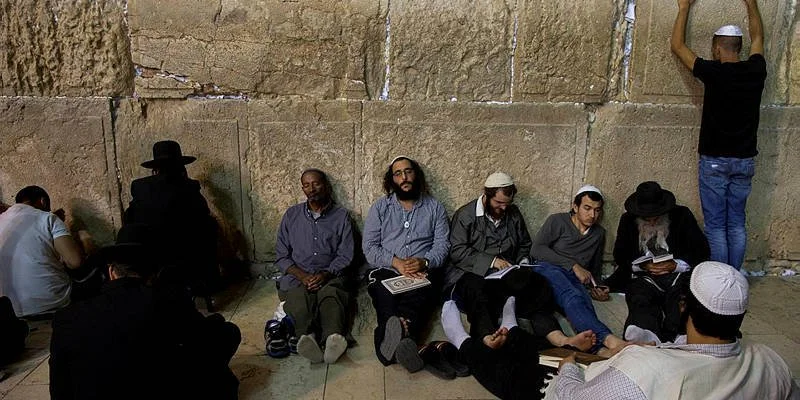The saddest time of the Jewish calendar is sandwiched between two fast days Shivah Asar BeTammuz - the seventeenth of Tammuz and Tisha B'Av. This period of time is called Beyn hametzarim ("between the straits" i.e. days of distress).
The 17th of Tammuz is the first of four fast days mentioned in the prophets. Originally, the fast was observed on the Ninth of Tammuz since that was the day Jerusalem fell prior to the destruction of the First Temple in 586 BCE. However, after Jerusalem fell on the 17th of Tammuz – prior to the destruction of the Second Temple – the Sages decided to combine observance for both tragedies on the 17th of Tammuz.
The purpose of a fast day is to awaken our sense of loss over the destroyed Temple – and the subsequent Jewish journey into exile. Through the process of Teshuva – self-introspection and a commitment to improve – we have the power to transform tragedy into joy. As the prophet Zechariah says: the 17th of Tammuz will become a day of "joy to the House of Judah, and gladness and cheerful feasts."
According to the Mishnah (Ta'anit 4:6), five calamities befell the Jewish people on Shiv'ah Asar B'Tammuz. (The Seventeenth of Tammuz):
Moses broke the two tablets of stone with the commandments that had been hewn by Hashem on Mount Sinai because the people had sinned by worshipping the Golden Calf.
The daily tamid offering ceased to be brought in the First Temple;
The walls of Jerusalem preceding the destruction of the Second Temple were breached;
Apostomus burned a Torah scroll;
An idol was erected in the Temple.
The period commencing with Rosh Chodesh Av is called the Nine Days. During this time, a stricter level of mourning is observed, in accordance with the Talmudic dictum (Ta'anit 26): "When the month of Av begins, we reduce our joy."
Avoid purchasing any items that bring great joy.
No home improvements, or the planting of trees and flowers.
Avoid litigation with non-Jews, since fortune is inauspicious at this time.
Abstain from the consumption of meat (including poultry) and wine. Sephardim start this restriction after Rosh Chodesh. These foods are symbolic of the Temple service, and are generally expressions of celebration and joy.
On Shabbat, meat and wine are permitted. This applies also to any other seuduat mitzvah -- for example, at a Brit Milah or at the completion of a tractate of Talmud.
Ahskenazim give the wine from Havdallah to a child to drink.
The Laws of the Three Weeks for Ashkenazim
The following restrictions are for Ashkenazim only. For Sephardim, these restrictions only apply to the week of Tisha B'Av.
Refrain from wearing newly laundered garments, or laundering any clothes or giving to the cleaner. If the "freshness" has been taken out of a garment prior to the Nine Days, it may be worn. Fresh clothes may be worn for Shabbat. The clothing of small children, which gets soiled frequently, may be laundered during the Nine Days.
Clothes may not be laundered even if done in preparation for after Tisha B'Av, or even if done by a non-Jew.
Do not bathe for pleasure. It is permitted to bathe in order to remove dirt or perspiration, or for medical reasons. This may be done only in cool water. Furthermore, the body should be washed in parts, rather than all at one time. Bathing in warm water is permitted on Friday in honor of Shabbat.
The Laws of the Three Weeks for Sephardim
The Three Weeks lasts from the fast on the 17th of Tammuz (Shiva Asar B'Tammuz) and end on the end of the 9th day of Av (The fast of Tisha B'Av). Eating meat and washing clothes should be delayed till midday of the Tenth of Av.
The mourning is divided into four levels of increasing severity:
From 17 Tammuz until the end of Tammuz
From Rosh Chodesh Av until the week that contains the 9th of Av
The week where the 9th of Av falls
The 9th of Av itself
This chart shows you what is permitted and what is prohibited during that particular time period of the three weeks.
| Activity | 17 Tammuz - End of Tammuz | Rosh Chodesh until week | Week of 9th of Av** | 9th of Av |
|---|---|---|---|---|
| Getting Married | Permitted | Prohibited | Prohibited | Prohibited |
| Saying Sheehcheyanu | Prohibited except on Shabbat | Prohibited | Prohibited | Prohibited |
| Taking a Shower | Permitted | Permitted | Permitted with Cold Water | Prohibited |
| Listening to Music | Prohibited unless Depressed | Prohibited | Prohibited | Prohibited |
| Acapella Music (sans instruments) | Permitted | Prohibited (lechatehila) | Prohibited (lechatehila) | Prohibited (lechatehila) |
| Swimming / Kosher Beach | Permitted | Permitted | Prohibited | Prohibited |
| Blessing Hagomel | Permitted | Permitted | Permitted | Prohibited |
| Blessing of HaTov V'HaMativ | Permitted | Permitted | Permitted | Permitted |
| Buying new shoes, clothing, and furnature | Permitted | Only if on sale or the price will increase | Prohibited | Prohibited |
| Washing Clothes | Permitted | Permitted | Prohibited | Prohibited |
| Shaving and Haircuts | Permitted | Permitted | Prohibited | Prohibited |
| Ironing | Permitted | Permitted | Prohibited | Prohibited |
| Wearing New Clothes | Prohibited except on Shabbat | Prohibited | Prohibited | Prohibited |
| Cutting Nails | Permitted | Permitted | Prohibited | Prohibited |
| Getting Engaged | Permitted | Permitted | Permitted | Permitted |
| Eating Meat or drinking wine | Permitted | Only on Rosh Chodesh and Havdallah | Prohibited | Prohibited |
| Dancing | Prohibited | Prohibited | Prohibited | Prohibited |

